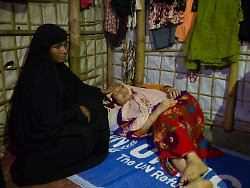Wednesday November 24th 2021
Bangladesh brings them to an island
Rohingya are being relocated against their will
Bangladesh has been criticized for its resettlement of Rohingya refugees. Since 2017, 20,000 people have been brought to a remote, flood-prone island. 2000 will now follow. You don’t move voluntarily.
Bangladesh has resettled Rohingya refugees to a remote and flood-prone island. The country’s deputy refugee commissioner, Moozzem Hossain, announced that Rohingya would be brought to the island of Bhashan Char tomorrow, Thursday, in 2000. The human rights organization Human Rights Watch (HRW) criticized the “forced relocation”.
Almost 20,000 members of the stateless minority, who fled neighboring Myanmar after brutal persecution by the military in 2017, have already been brought to the island. The last group, however, was relocated to the island 60 kilometers from mainland Bangladesh more than six months ago. This is in an area where there are frequent strong cyclones. Hundreds of people have fled the island after being resettled. Ultimately, Bangladesh wants to accommodate 100,000 of the approximately one million Rohingya refugees on the island. So far, these have been living in cramped refugee camps on the mainland.
Authorities have apparently designated families for resettlement
Agency representative Hossain said that all relocations are entirely voluntary. However, several refugees said they would be forced to move there. “We don’t want to go to Bhashan Char,” a Rohingya who wanted to remain anonymous told AFP on the phone. She said a Rohingya community leader in her camp put her name on the list without her consent. A Rohingya community leader, who also wanted to remain anonymous, said authorities had asked him and his colleagues to each submit lists of at least five families to be relocated.
The UN refugee agency UNHCR signed an agreement with the Bangladeshi authorities last month to provide assistance and protection to the refugees on the island. Human Rights Watch urged Bangladesh to halt further resettlements until the refugees can be guaranteed freedom of movement. According to HRW, the leaders of the Rohingya are being forced to move the camp residents, for example by removing identification papers. “Bangladesh’s October deal with the UN does not provide a free pass to the forced relocation of Rohingya refugees,” said Bill Frelick, director of refugee and migrant rights at HRW.
